Recall:
Energy->Water->Food->Culture
(Also Chapter 12 in Froggie book)
Water: key points
Section one: What is it, where is it:
Freshwater, saltwater, how it moves, aquifers and reservoirs, impact of climate change, water wars
Section two: Pollution:
Often human driven (anthropogenic): Nutrient, thermal, BOD, sediment
Almost always human driven: Pathogens, inorganic chemicals, organic chemicals, radioactive chemicals
Section three: Water Quality index:
DO, BOD, pH, temp, turbidity, conductivity, nitrates (NO3), phosphates (PO4)
Section one: What is it, where is it?
Where is the water? Note: 97% salt water
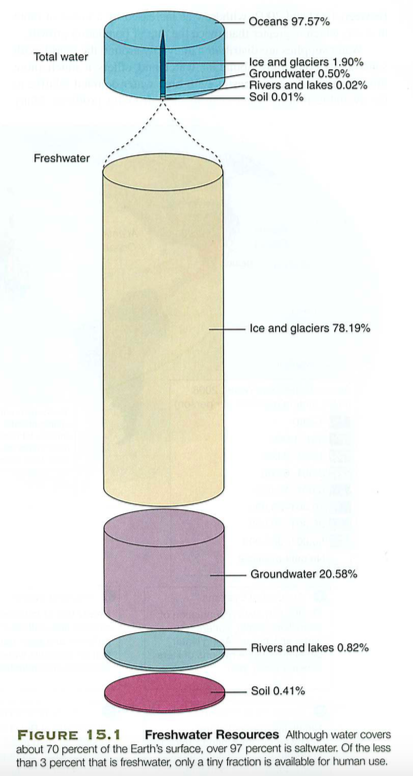
How does it get there?
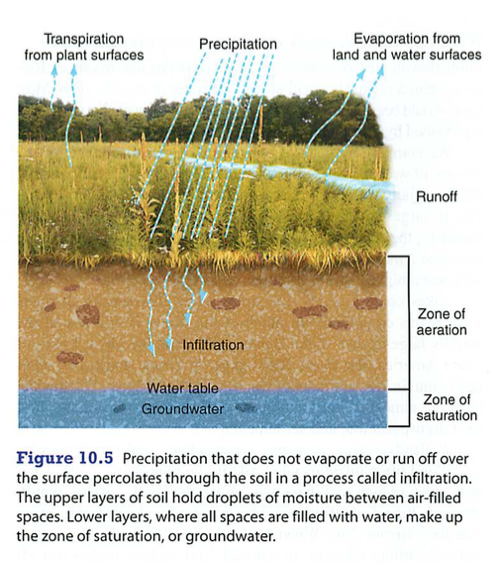 |
| Click for full-size image |
Our volcanic island is a bit different: A shield volcano
 |
| Click for full-size image |
 |
| Click for full-size image |
Aquifers: open or closed ("captive")
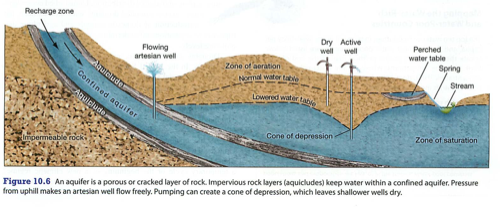 |
| Click for full-size image |
Huge Ogallala aquifer-note recharge time is in centuries, pesticides in Nebraska, cancer rates there are very high...
 |
| Click for full-size image |
Water diversion schemes, usually rivers:
Look up Three Gorges Dam in China
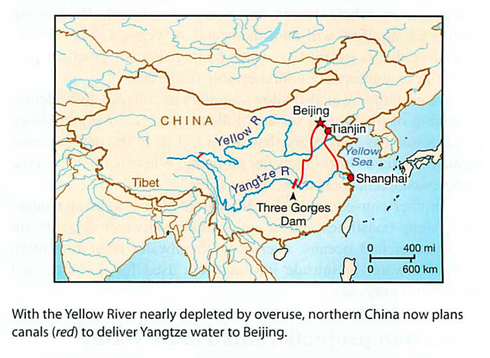
Two emerging critical issues for China due to climate crisis:
- Pearl river delta and salt intrusion (sea level rise): gradual slope, so 1 meter of sea-level rise is many km of salt intrusion, so no more rice farming in that area
- Vanishing Himalayan Glaciers: no farming in western China, no annual flow through their two main rivers
Glaciers are the "water towers" for all of Asia...
Rivers impacted:
Ganges, Yangtze, Yellow, Mekong, Brahmaputra, Irrawaddy, Indu, Salween,
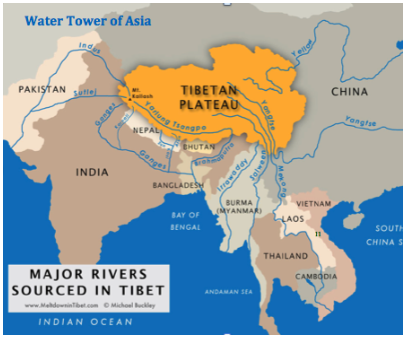
Another example: Aral Sea (asia minor)
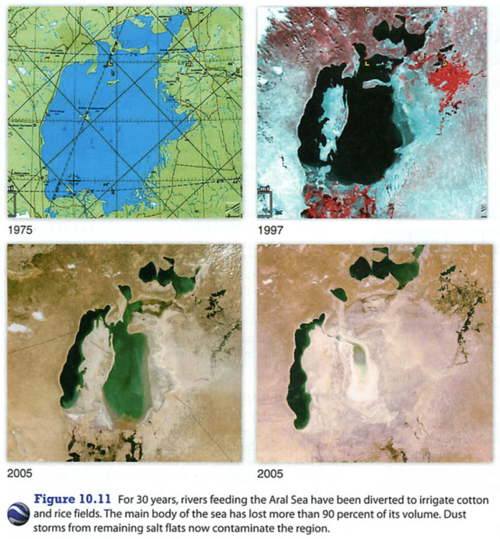 |
| Click for full-size image |
Notable Water disputes: Energy wars, water wars, then food wars...
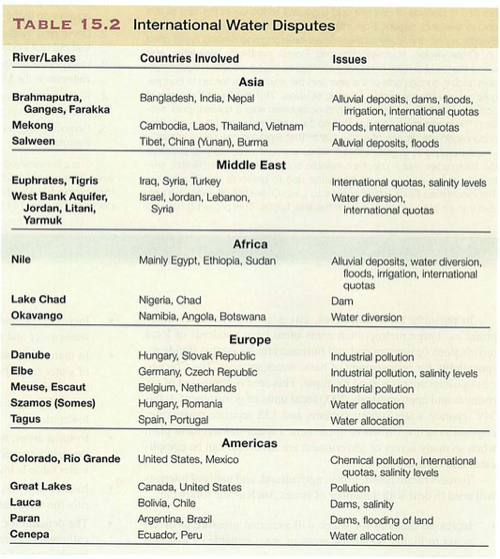 |
| Click for full-size image |
Section two: Water Pollution
Big ideas:
- Rivers are continuous, so easier to find sources along the route (continuity analysis: all sources add to total)
- Groundwater is harder to determine point sources, as flow is over larger area (not confined by river banks) and there is no continuity analysis possible (we don't know sources and sinks)
- Oceans are the hardest to trace, and impact everyone eventually, just like the atmosphere, only without the rain, and it is wetter. And full of fish.
Major Water Pollution categories:
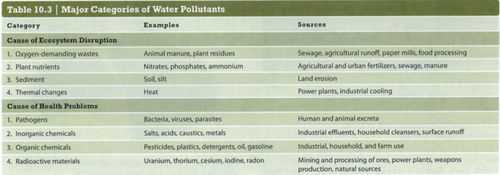 |
| Click for full-size image |
Water Pollutant list: Common culprits
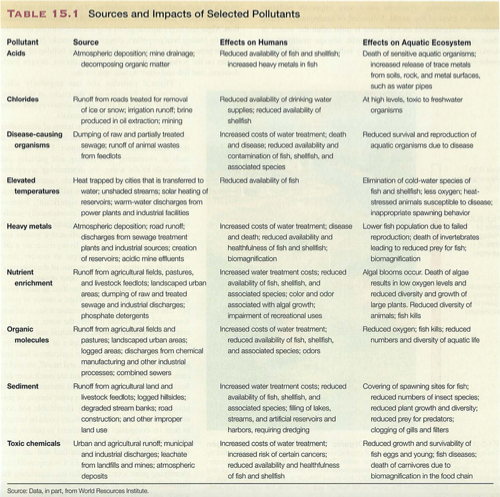 |
| Click for full-size image |
Industrial farming: note nitrate levels:
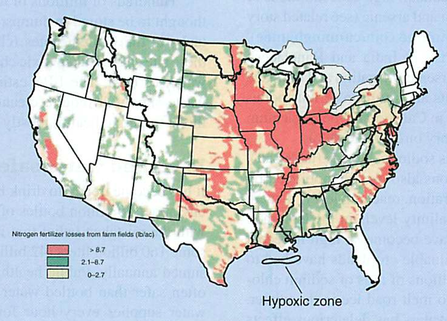
Why is there a hypoxic zone there?
Biochemical Oxygen Demand (BOD):
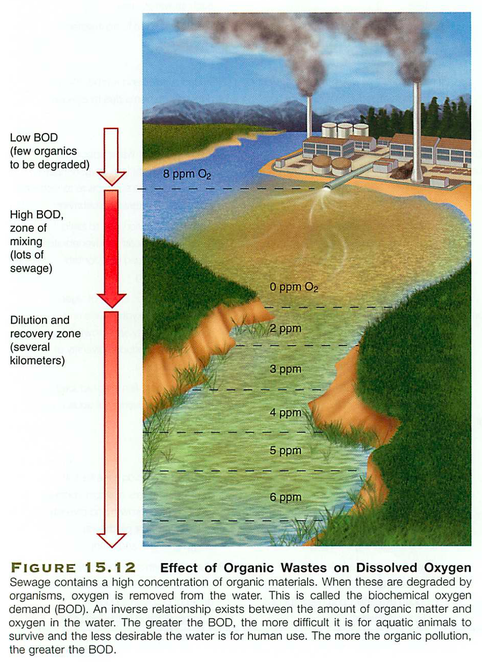
Better diagram:
 |
| Click for full-size image |
Note that temperature changes DO (dissolved oxygen) content, so does physical agitation (aeration).
Section three: Water Quality Index:
http://www.water-research.net/watrqualindex/index.htm
Calculation worksheet:
Main case studies-each related to a form of human pollution:
Case 1: High turbidity
Causes: erosion of topsoils, till farming, no cover crops, e.g. dustbowl in the US
Impact: poor light transmission, so low photosynthesis, low DO
Case 2: Low Dissolved Oxygen (DO)
Causes: Thermal pollution, e.g. power plants on rivers
Case 3: Eutrophication (high N and/or P)
Causes: Fertilizers, animal waste, e.g. Mississippi dead zone, Chesapeake bay
Chesapeake bay is the perfect storm of these three:
1. Warm water: shallow, so no cool lower zone away from sunlight, dissolved solids turn visible light into heat
2. High Turbidity: watershed runoff from rivers to the Appalachian range and north to NY state
3. Eutrophication: chicken and pig farms, runoff from farms along watershed
See also point source and non-point source pollution (from Poisoned Waters video, remember the Deer?)
Important: cooler water holds dissolved oxygen better (fishermen know this, so do the fish).
Water Quality Lab:
Tests: Probe sets
- Turbidity sensor: passes light through a small vial, measures light that passes, low light=high turbidity
- Conductivity: passes electric current through sample, proportional to salt content
- Temperature: warmer water has lower DO
- Dissolved Oxygen: amount of oxygen dissolved in the sample
- pH: acid/base tendency
Tests: dip strips:
- Alkalinity
- pH
- Hardness (calcium/mineral content)
- Iron
- Copper
- Lead
- Nitrate
- Nitrite
- Chlorine
Lab samples
- Post waterfall
- Post power plant
- Everglades close to ocean
- Post sewage plant
- Best fishing spot
- Mine tailings runoff
- Snow melt river
- Mississippi river
- Chesapeake river
- Flood after monsoon rains
- Golf course runoff
- Eutrophied lake
Metrics:
- DO
- BOD
- pH
- temperature
- turbidity
- conductivity
- nitrates
- phosphates
Simulated locations:
Samples:
Sample A
- DO:1.5
- BOD:low
- pH:7
- temperature:30°C
- turbidity:high
- conductivity:low
- nitrates:high
- phosphates:high
Sample B
- DO:6
- BOD:low
- pH:7
- temperature:10°C
- turbidity-low
- conductivity-low
- nitrates-low
- phosphates-low
Sample C
- DO: 4
- BOD:low
- pH:8
- temperature:25°C
- turbidity: high
- conductivity: high
- nitrates: high
- phosphates: high
Sample D-
- DO: 2
- BOD: high
- pH:5
- temperature: 28°C
- turbidity:high
- conductivity: low
- nitrates: low
- phosphates: high
Sample E
- DO: 2
- BOD:low
- pH:2
- temperature:20°C
- turbidity:high
- conductivity: high
- nitrates: low
- phosphates: low
Sample F
- DO: 1
- BOD: high
- pH: 4
- temperature: 30°C
- turbidity: high
- conductivity: high
- nitrates: high
- phosphates: high
/groups/apenvironmentalscience/search/index.rss?tag=hotlist/groups/apenvironmentalscience/search/?tag=hotWhat’s HotHotListHot!?tag=hot6/groups/apenvironmentalscience/sidebar/HotListadminadmin2020-08-19 15:43:59+00:002020-08-19 15:43:59updated30adminadmin2011-09-08 21:36:21+00:002011-09-08 21:36:21updated29adminadmin2011-08-24 23:20:40+00:002011-08-24 23:20:40updated28adminadmin2011-08-24 22:42:36+00:002011-08-24 22:42:36updated27adminadmin2011-08-22 02:41:09+00:002011-08-22 02:41:09updated26adminadmin2011-08-22 02:40:02+00:002011-08-22 02:40:02updated25adminadmin2011-08-21 20:39:11+00:002011-08-21 20:39:11updated24adminadmin2011-08-21 20:30:42+00:002011-08-21 20:30:42updated23adminadmin2011-08-21 20:30:13+00:002011-08-21 20:30:13updated22adminadmin2011-08-21 20:25:48+00:002011-08-21 20:25:48updated21adminadmin2011-08-21 20:25:18+00:002011-08-21 20:25:18updated20adminadmin2011-08-21 00:22:12+00:002011-08-21 00:22:12updated19adminadmin2011-08-21 00:18:56+00:002011-08-21 00:18:56updated18adminadmin2011-08-21 00:15:43+00:002011-08-21 00:15:43updated17adminadmin2011-08-21 00:12:37+00:002011-08-21 00:12:37updated16adminadmin2011-08-21 00:12:02+00:002011-08-21 00:12:02updated15adminadmin2011-08-20 23:59:41+00:002011-08-20 23:59:41updated14Added tag - hotadminadmin2011-08-20 23:59:38+00:002011-08-20 23:59:38addTag13Added tag - conservationadminadmin2011-08-20 23:59:32+00:002011-08-20 23:59:32addTag12Added tag - critical thinkingadminadmin2011-08-20 23:59:19+00:002011-08-20 23:59:19addTag11Added tag - ch1adminadmin2011-08-20 23:59:08+00:002011-08-20 23:59:08addTag10Added tag - sustainabilityadminadmin2011-08-20 23:59:05+00:002011-08-20 23:59:05addTag9adminadmin2011-08-20 20:47:39+00:002011-08-20 20:47:39updated8adminadmin2011-08-20 20:46:15+00:002011-08-20 20:46:15updated7adminadmin2011-08-20 20:43:07+00:002011-08-20 20:43:07updated6adminadmin2011-08-20 19:14:13+00:002011-08-20 19:14:13updated5adminadmin2011-08-20 19:11:26+00:002011-08-20 19:11:26updated4adminadmin2011-08-20 18:59:57+00:002011-08-20 18:59:57updated3adminadmin2011-08-20 18:56:59+00:002011-08-20 18:56:59updated2First createdadminadmin2010-11-07 01:41:28+00:002010-11-07 01:41:28created1wiki2020-08-19T15:43:59+00:00groups/apenvironmentalscience/wiki/welcomeFalseCh01 Overview/groups/apenvironmentalscience/wiki/welcome/Ch01_Overview.htmladmin30 updatesCh01 Overview
Welcome to our APES wiki. You should be able to do the following after logging in with your account:
To create a new page, click the ...Falseadmin2020-08-19T15:43:59+00:00adminadmin2013-02-05 02:24:03+00:002013-02-05 02:24:03updated4Added tag - hotadminadmin2013-02-05 02:24:02+00:002013-02-05 02:24:02addTag3adminadmin2013-02-05 02:05:35+00:002013-02-05 02:05:35updated2First createdadminadmin2013-02-05 02:03:35+00:002013-02-05 02:03:35created1wiki2013-02-05T02:24:03+00:00groups/apenvironmentalscience/wiki/394a8FalseEnergy notes/groups/apenvironmentalscience/wiki/394a8/Energy_notes.htmladmin4 updatesEnergy notes
Week of 2.4.13: energy wrap-up
e2 video: coal vs. nuclear in class
AP exams: FRQ
2002.1
2004.2
2006.1
2007.2
2008.1
...Falseadmin2013-02-05T02:24:03+00:00adminadmin2013-02-05 02:23:20+00:002013-02-05 02:23:20updated6Added tag - hotadminadmin2013-02-05 02:23:18+00:002013-02-05 02:23:18addTag5adminadmin2013-02-05 02:23:12+00:002013-02-05 02:23:12updated4adminadmin2013-02-05 02:21:48+00:002013-02-05 02:21:48updated3adminadmin2013-02-05 02:20:26+00:002013-02-05 02:20:26updated2First createdadminadmin2013-02-05 02:06:00+00:002013-02-05 02:06:00created1wiki2013-02-05T02:23:20+00:00groups/apenvironmentalscience/wiki/c360bFalseFeb-May plan/groups/apenvironmentalscience/wiki/c360b/FebMay_plan.htmladmin6 updatesFeb-May plan
1. conclusion of energy chapters (see previous wiki)
2. GCC AP questions FRQ:
2006.2
2005.3
2005.4
2007.3
...Falseadmin2013-02-05T02:23:20+00:00adminadmin2012-03-07 05:53:55+00:002012-03-07 05:53:55updated14adminadmin2012-03-07 05:43:38+00:002012-03-07 05:43:38updated13adminadmin2012-03-07 05:41:35+00:002012-03-07 05:41:35updated12adminadmin2012-03-07 05:38:57+00:002012-03-07 05:38:57updated11Added tag - hotadminadmin2012-03-07 05:38:55+00:002012-03-07 05:38:55addTag10adminadmin2012-03-07 05:36:47+00:002012-03-07 05:36:47updated9adminadmin2012-03-07 05:22:26+00:002012-03-07 05:22:26updated8adminadmin2012-03-07 05:20:01+00:002012-03-07 05:20:01updated7adminadmin2012-03-07 05:18:58+00:002012-03-07 05:18:58updated6adminadmin2012-03-07 04:58:55+00:002012-03-07 04:58:55updated5adminadmin2012-03-07 04:57:33+00:002012-03-07 04:57:33updated4adminadmin2012-03-07 04:56:53+00:002012-03-07 04:56:53updated3adminadmin2012-03-07 04:54:20+00:002012-03-07 04:54:20updated2First createdadminadmin2012-03-07 04:53:33+00:002012-03-07 04:53:33created1weblog2012-03-07T05:53:55+00:00groups/apenvironmentalscience/weblog/de030FalseGreen Apple/groups/apenvironmentalscience/weblog/de030/Green_Apple.htmladmin14 updatesGreen Apple
Team,
Please watch this video about NYC:
Trailer:
http://www.pbs.org/e2/episodes/101_the_green_apple_trailer.html
On the server:
http://physics.hpa...Falseadmin2012-03-07T05:53:55+00:00adminadmin2011-09-13 19:08:24+00:002011-09-13 19:08:24updated4Added tag - hotadminadmin2011-09-13 19:08:22+00:002011-09-13 19:08:22addTag3adminadmin2011-09-13 19:08:10+00:002011-09-13 19:08:10updated2First createdadminadmin2011-09-13 19:04:30+00:002011-09-13 19:04:30created1weblog2011-09-13T19:08:24+00:00groups/apenvironmentalscience/weblog/4ecddFalseQuestions for Wednesday, wiki adds/groups/apenvironmentalscience/weblog/4ecdd/Questions_for_Wednesday_wiki_adds.htmladmin4 updatesQuestions for Wednesday, wiki adds
Team,
I'd like to try something for class tomorrow: each of you to create a question from chapter 3, and email it to me by this evening (Tuesday). Pl...Falseadmin2011-09-13T19:08:24+00:00hot/groups/apenvironmentalscience/search/index.rss?sort=modifiedDate&kind=all&sortDirection=reverse&excludePages=wiki/welcomelist/groups/apenvironmentalscience/search/?sort=modifiedDate&kind=all&sortDirection=reverse&excludePages=wiki/welcomeRecent ChangesRecentChangesListUpdates?sort=modifiedDate&kind=all&sortDirection=reverse&excludePages=wiki/welcome0/groups/apenvironmentalscience/sidebar/RecentChangesListmodifiedDateallRecent ChangesRecentChangesListUpdateswiki/welcomeNo recent changes.reverse5searchlist/groups/apenvironmentalscience/calendar/Upcoming EventsUpcomingEventsListEvents1Getting events…
Comments